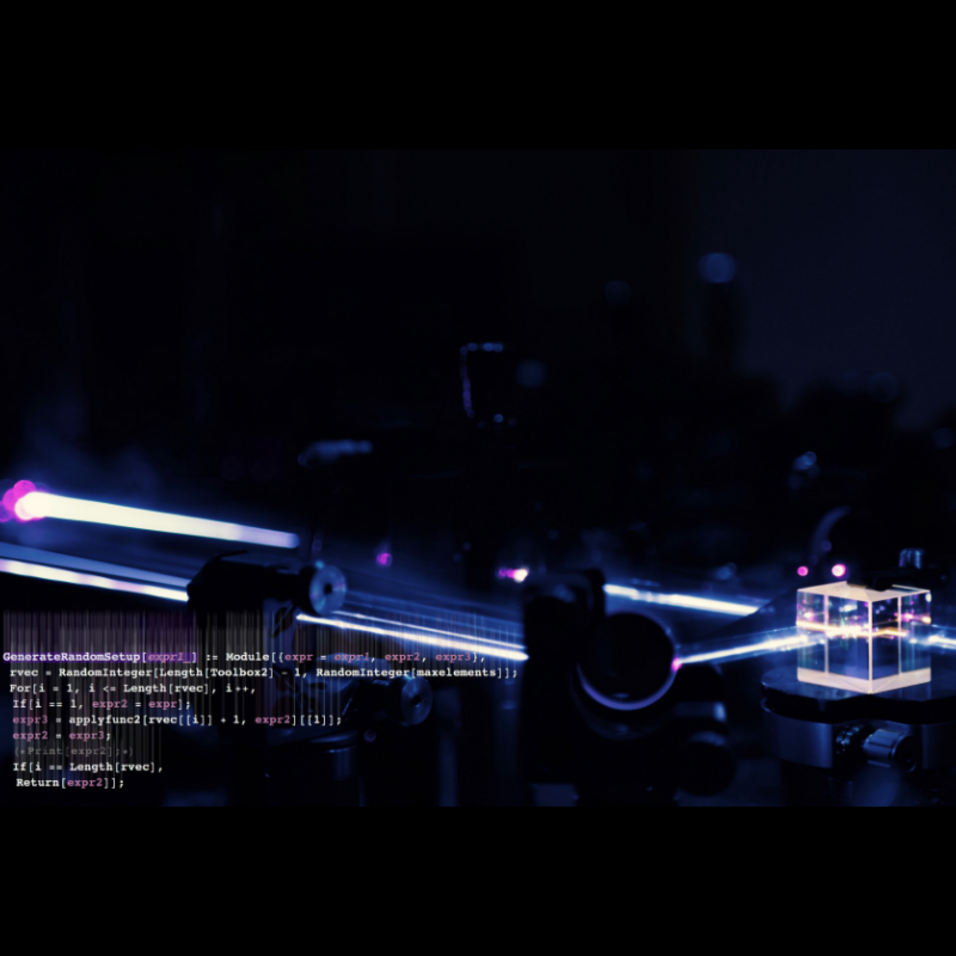Similar to bits in conventional computers, QuBits are the smallest unit of information in quantum systems. Big companies like Google and IBM are competing with research institutes around the world to produce an increasing number of entangled QuBits. The clear motivation is to develop a functioning quantum computer. A research group at the University of Vienna and the Austrian Academy of Sciences, however, is pursuing a new path to increase the information capacity of complex quantum systems.
The idea behind it is simple: instead of just increasing the number of particles involved, the complexity of each system is increased. "The special thing about our experiment is that for the first time it entangles three photons beyond the conventional two-dimensional nature," explains Manuel Erhard, first author of the study. For this purpose, the Viennese physicists use quantum systems which have more than two possible states - in this particular case, the angular momentum of individual light particles. These individual photons now have a higher information capacity than QuBits. However, the entanglement of these light particles turned out to be difficult on a conceptual level. The researchers overcame this challenge with a ground-breaking idea: a computer algorithm that autonomously searches for an experimental implementation.
With the help of the computer algorithm Melvin an experimental setup to produce this type of entanglement has been uncovered. At first this was still very complex, but at least it worked in principle. After some simplifications, physicists still faced major technological challenges. The team was able to solve these with state-of-the-art laser technology and a specially developed multi-port. "This multi-port is the heart of our experiment and combines the three photons so that they are entangled in three dimensions," explains Manuel Erhard.
The peculiar property of the three-photon entanglement in three dimensions allows for experimental investigation of new fundamental questions about the behaviour of quantum systems. In addition, the results of this work could also have a significant impact on future technologies, such as quantum teleportation. "I think the methods and technologies that we developed in this publication allow us to teleport a higher proportion of the total quantum information of a single photon, which could be important for quantum communication networks," Anton Zeilinger points out into the future of possible applications.
Publication in Nature Photonics:
„Experimental Greenberger-Horne-Zeilinger Entanglement Beyond QuBits“, Manuel Erhard, Mehul Malik, Mario Krenn & Anton Zeilinger, doi.org/10.1038/s41566-018-0257-6
Wissenschaftliche Kontakte
Manuel Erhard (manuel.erhard@univie.ac.at)
Anton Zeilinger (anton.zeilinger@univie.ac.at)
Rückfragehinweis:
Stephan Brodicky
Pressebüro der Universität Wien
Forschung und Lehre
1010 Wien, Universitätsring 1
T +43-1-4277-175 41
M +43-664-60277-175 41
stephan.brodicky@univie.ac.at
Sven Hartwig
Leiter Öffentlichkeit & Kommunikation
Österreichische Akademie der Wissenschaften
Dr. Ignaz Seipel-Platz 2, 1010 Wien
T +43 1 51581-1331
sven.hartwig@oeaw.ac.at
Österreichische Akademie der Wissenschaften
Forschen für morgen.
Die Österreichische Akademie der Wissenschaften hat die gesetzliche Aufgabe, „die Wissenschaft in jeder Hinsicht zu fördern“. 1847 als Gelehrtengesellschaft gegründet, steht sie mit ihren heute über 770 Mitgliedern, 28 Forschungsinstituten sowie rund 1.600 Mitarbeiter/innen für innovative Grundlagenforschung, interdisziplinären Wissensaustausch und die Vermittlung neuer Erkenntnisse – mit dem Ziel zum wissenschaftlichen und gesamtgesellschaftlichen Fortschritt beizutragen. www.oeaw.ac.at
Offen für Neues.
Die Universität Wien ist eine der ältesten und größten Universitäten Europas: An 19 Fakultäten und Zentren arbeiten rund 9.500 MitarbeiterInnen, davon 6.600 WissenschafterInnen. Die Universität Wien ist damit die größte Forschungsinstitution Österreichs sowie die größte Bildungsstätte: An der Universität Wien sind derzeit rund 94.000 nationale und internationale Studierende inskribiert. Mit 174 Studien verfügt sie über das vielfältigste Studienangebot des Landes. Die Universität Wien ist auch eine bedeutende Einrichtung für Weiterbildung in Österreich. www.univie.ac.at



